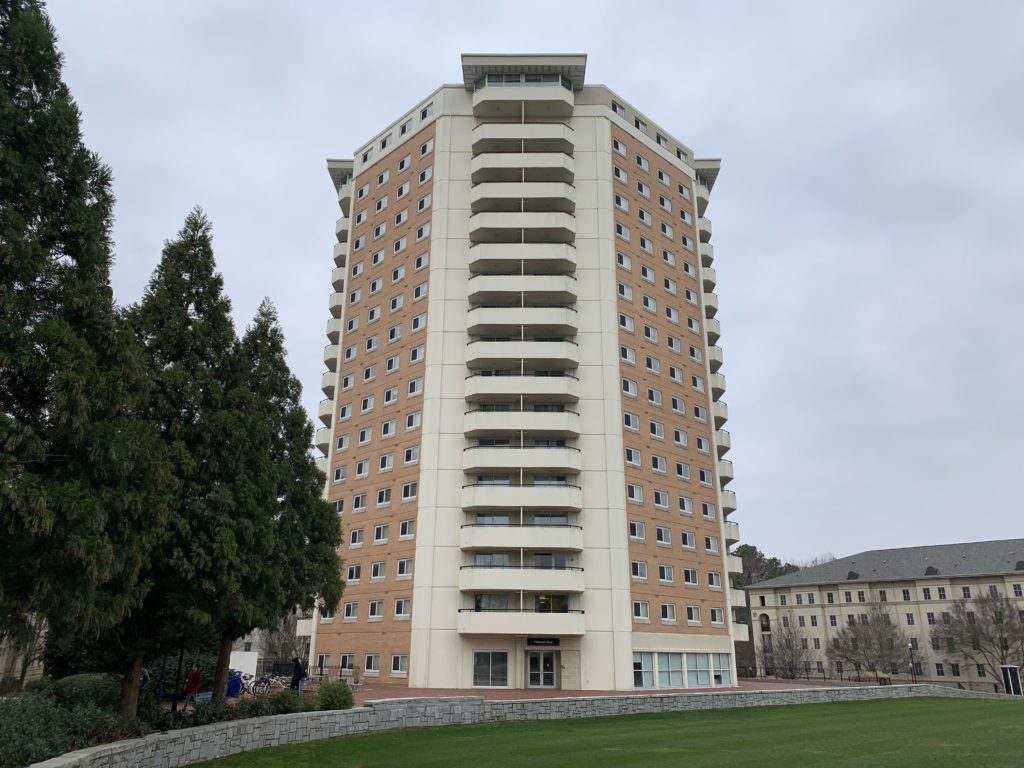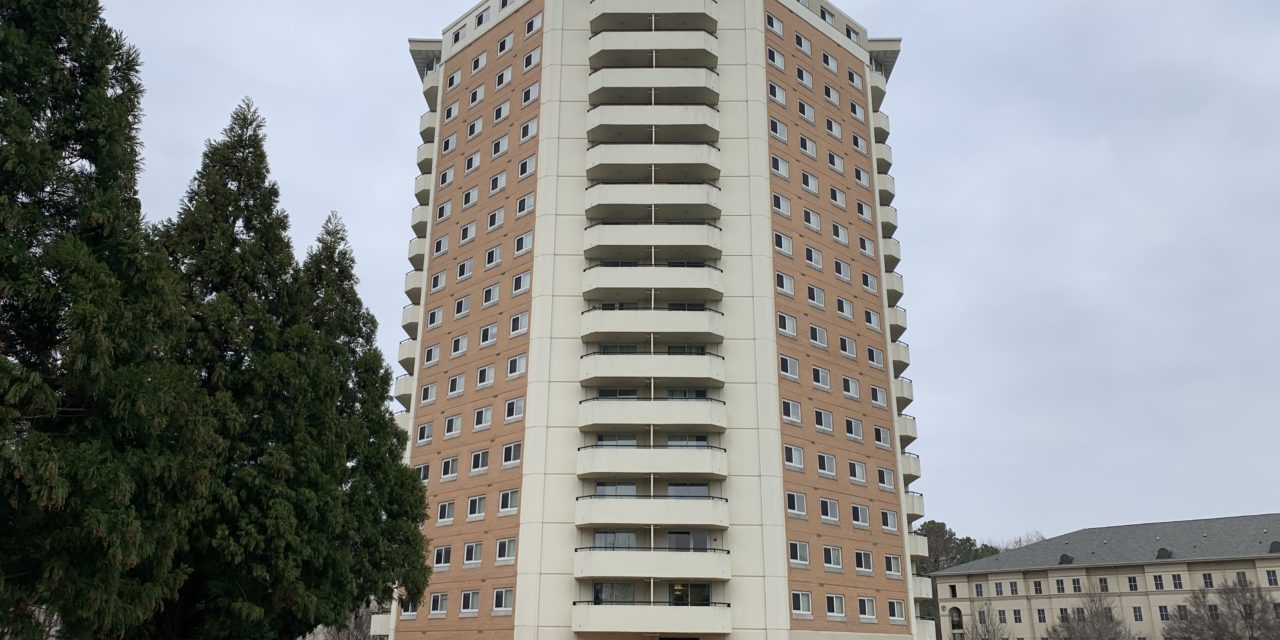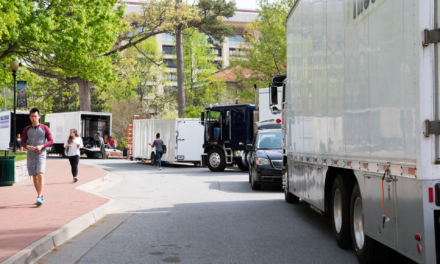
Many students remaining in University housing after the transition to remote learning live at Clairmont Towers/Forrest Martin, Photo Editor
About 375 students remain at Emory’s Clairmont Campus after the University’s transition to remote learning, according to Director of Conference Services and Housing Administration Sherry Ebrahimi (97C). These students requested to stay in on-campus housing by filling out a form sent to students in a March 12 email, which stated that students facing financial hardship or difficulties returning to their home countries could have the option to remain at Emory for the rest of the semester.
Joshua Anderson (20Ox) is a low-income, first-generation student who moved from Emory’s Oxford campus to Clairmont Campus, where he will live for the rest of the semester. Oxford students traditionally leave their close-knit campus, located one mile from Covington, Georgia, after two years and are formally welcomed to the Atlanta campus at the beginning of the fall semester. Anderson arrived at his new home earlier than expected and under disheartening circumstances.
Anderson emphasized his overall satisfaction with the transition to Clairmont and noted the difficulties, such as having to account for changing student travel plans, that University administrators faced in organizing extended housing.
However, Anderson said that Oxford students who applied to stay in University housing were originally told that they would remain at the Oxford campus but then were later told to pack and move to Clairmont.
One of the most pressing challenges Anderson faced in his transition to Clairmont was securing household supplies out-of-pocket to move into an apartment-style room.
“As a first-generation, low-income student, I don’t necessarily have a lot of money to go out and buy these supplies — to go out and buy pots and pans or buy toilet paper, if there even is any,” Anderson said. “The bed sizes [at Clairmont] are different; that was actually one of the things we were notified about, … [that] we would have to get sheets to fit the bed. … Pretty much immediately within transitioning here, you have to go out and buy the supplies that are needed.”
Yichang Yang (22C), an international student from China who now lives in Clairmont Tower, said that all remaining students live in their own apartment without roommates and that there is little social interaction between students.
“I only ever leave my apartment for grocery shopping once a week to get the necessities like food or paper towels, which [are] sold out in most markets,” Yang said. “I spend most of my time staying in this apartment; classes, cooking, I do it all individually.”
In a March 24 email sent to students remaining in University housing, Senior Director of Housing Operations Elaine Turner wrote that each student would move to a new housing assignment at Clairmont by March 29, where they would live for the remainder of the semester without roommates.
Yang rarely visits his friends who live on campus, preferring to use Zoom to communicate despite living minutes away from each other. He has noticed, however, that couples remain close and will continue to see each other.
Anderson said living at Emory during a statewide quarantine is bizarre, as the campus and surrounding neighborhood — usually bustling with students, professors and heavy traffic — is eerily empty.
“It’s especially odd coming from Oxford College, which is a more inherently social place where you’re bound to bump into people you know and hold conversations,” he said.
The lack of students has also helped ease Anderson’s acclimation to the Atlanta campus, where he was previously anxious about the number of new faces and the larger environment.
Yang said that the University provides boxed meals for students to take, but he believes that many students prefer to cook for themselves. Anderson saw on his first day on campus that the University had run out of meals for students, which put more pressure on him to cook for himself.
With the pandemic causing a sharp rise in the demand for toilet paper, supermarkets across the country have faced shortages in what has now become a valuable product. Anderson said that a variety of other essential household items such as pots and pans are difficult to find as well.
“Pretty much immediately upon coming here I had to go out and look for toilet paper,” Anderson said. “I haven’t found any, [so] I’m using Bounty napkins right now — and I know I’m not the only one struggling with this.
Yang has circumvented these outages by going to Asian supermarkets, where he says toilet paper is more consistently stocked on shelves.
“I feel like Americans are more obsessed with toilet paper, but not for Chinese Americans or Korean Americans, so if you actually need toilet paper, you can go to the Chinese market,” Yang said. “In Publix and Kroger, I went there several times in the past few weeks, and they are all out — like totally out.”
When Yang does go shopping, he tries to protect himself by wearing a face mask and gloves.
Who stays? Who can’t?
Ebrahimi noted that the number of students being considered for on-campus housing was constantly changing because of how quickly student travel plans would change.
“This number has been extremely fluid,” Ebrahimi said. “We had granted a bunch of folks [housing], and then they found ways home so the number dropped, and then we had a second wave of people that thought they had plans, and then they didn’t. That’s what’s been really tough on our end; the numbers are just so fluid.”
Ebrahimi said that social distancing protocols meant that not every applicant could be granted housing because students would have to be spread across Clairmont.
Anderson said his living condition at home would have been unstable enough that he would not have been able to complete his coursework. His mother has underlying health concerns that make her particularly at risk for coronavirus.
Constance Wang (22C), an international student from China, originally considered returning home but ultimately decided that the trip would have been too dangerous.
“My parents thought that the 20-something hour flight back to China would be very dangerous … [because] the circulation on a plane would be bad,” Wang said. “I would also have to be quarantined for 14 days in a hotel in China … I was not ready for that.”
Yang said he thought it would be impossible for him to continue his studies while in China because of a lack of quality internet connection, the time difference and the inability to use certain internet websites or applications, such as YouTube, that are unavailable in China.
Wang said the University took about a week to accept her application to remain on campus. She was told by her Resident Advisor that she would live at Clairmont Campus, but the official University announcement was not made until a few days before she moved.
Anderson found one of the more difficult mental issues with being quarantined in University housing is being unable to see his family.
“[I’m not] able to see my mom and little brother back at home, but I see people on Snapchat and Facebook and Instagram, talking about things they are doing with their parents in isolation,” Anderson said. “I guess that’s been the thing that’s most mentally and emotionally stressful — is knowing that my circumstances as a first-generation, low-income student don’t necessarily mean I can go back home during this situation.”
Former Editor-in-Chief | Isaiah Poritz (he/him) (21C) is from Salt Lake City, Utah, and majored in political science.






